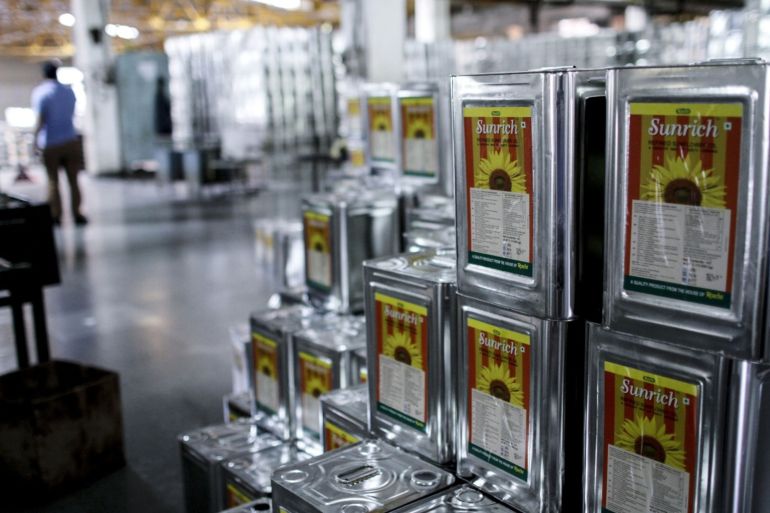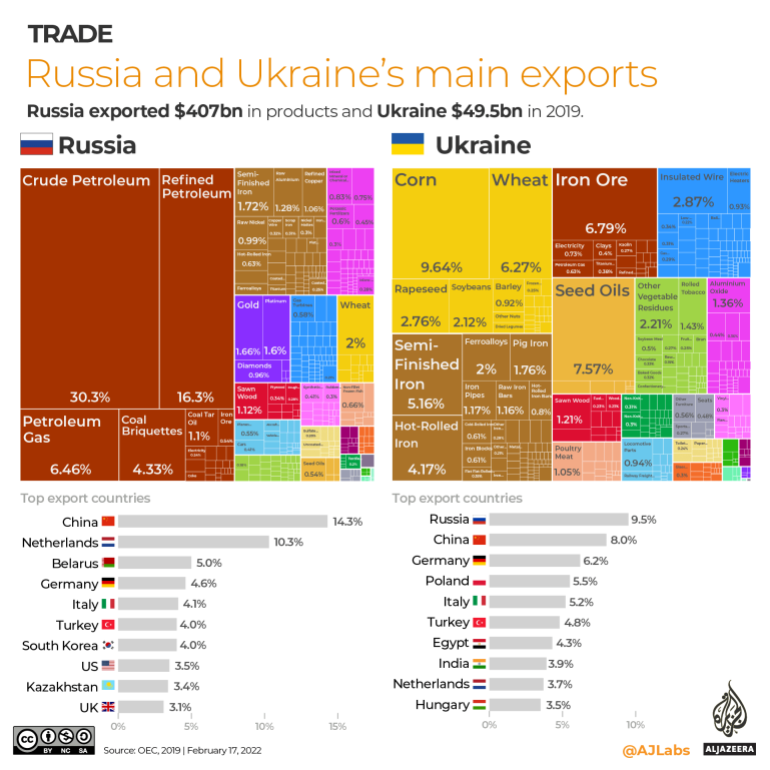Can Brazil and Argentina satiate India’s food oil hunger?
After the war disrupted Ukrainian supplies and Indonesia banned palm oil exports, India looked at new markets for its needs.

Bengaluru, India – Aneesha Thakur has used sunflower oil in her kitchen for as long as she can remember. Last week, she broke with that habit, buying a bottle of soybean oil instead to fry fish for her teenage sons.
The neighbourhood supermarket, which usually has rows stacked with sunflower oil brands, had none of the major ones when she visited, she said. So Thakur, a sales executive, settled on what she thought was the next best option. “They’re always hungry, and thankfully, they liked it,” she told Al Jazeera, referring to her children.
Keep reading
list of 4 itemsIndia cuts tax on palm oil imports to help consumers, refiners
Indians cut down on necessities as Ukraine war inflates prices
Musk and Twitter, inflation woes, and a palm oil crisis
They might not have too much of a choice for the next few months.
Ukraine is the world’s biggest exporter of sunflower oil and India is its largest market.
Russia’s invasion of its eastern neighbour has forced India — overall the world’s biggest importer of edible oils — to look to Argentina and Brazil, thousands of kilometres away, for help to keep its kitchen economics afloat.
Between November and March, India bought 45 percent more soybean oil than last year from the two biggest exporters of the commodity, according to data from the Solvent Extractors Association of India, an industry body. That includes a nearly sevenfold spike in purchases from Brazil. The dependence on the South American nations has only grown after Indonesia banned palm oil exports in late April to guard against supply shortages at home.
But a rare confluence of poor harvests, on top of the war, means that even this frenzied buying will likely fail to quench India’s thirst for edible oils, experts are warning. Brazil and Argentina are experiencing droughts that are expected to hurt their harvests. And Canada, the world’s biggest producer of canola oil — an alternative India might have considered — had its worst yield in 14 years in 2021, also because of a drought. Seeding has just started for this season.
“Everything that could go wrong has gone wrong, and all together,” Mintak Joo, a veteran edible oils research analyst at Gro Intelligence, a New York-based agricultural consulting firm, told Al Jazeera.
For Indian families, the challenge is real. By end-April, refined palm oil was 27 percent costlier than a year ago, and crude soybean oil was 22 percent more expensive. For New Delhi, that is a political problem too — food prices have brought governments down in the past.
‘Consequences of conflict’
At the government-backed Raisina Dialogue, India’s premier strategic affairs conclave where security, war and alliances are the staple diet, edible oils made an entry in April. Argentinian Foreign Minister Santiago Cafiero was a guest at the conclave, and Indian External Affairs Minister S Jaishankar nodded to the growing role of oil as a catalyst in their ties, especially in the backdrop of the war in Ukraine. “These are interesting globalisation consequences of conflicts,” Jaishankar said. “Argentina has emerged as one of our biggest sources of edible oils.”
Indeed, between November and March, Argentina was the second-largest supplier of edible oils to India, including a sprinkle of some sunflower oil. And Brazil is catching up. Daniele Siqueira, an analyst at Brazilian consultancy AgRural Commodities, has reviewed her country’s customs data and found that an unprecedented two-thirds of its total soybean oil exports between November and March were just to India, she told Al Jazeera. “It’s been way larger than normal since late last year,” she said.
India’s mounting appetite for soybean oil reflects in overall bilateral trade too, with imports from Argentina up 37 percent in February compared with last year, and rising even more steeply, by 178 percent, from Brazil.
But the good times might not last. Brazil, in a bid to capitalise on the food oils crisis, has also exported record volumes of soybean oil in the first few months of this year, and will have less than usual to supply to the world in the coming months, Siqueira said, predicting a decline in exports soon. In March, Argentina briefly stopped exports of soybean oil to manage domestic demand, and though it soon resumed trade, experts warn that the move underscored the possibility of future restrictions.
Distance too will prove an important factor for India. Ships carrying oil from Brazil or Argentina take several weeks longer to reach India than those from Indonesia. “Even if you order a surge in imports, it will take longer to get to India, and can’t be what you depend on for immediate needs,” Hari Seshasayee, a global fellow at the Wilson Center, told Al Jazeera.
The United States is also a major soybean oil producer. But India has a preferential trading agreement with Mercosur, a bloc consisting of Brazil, Argentina, Uruguay and Paraguay, making it more affordable to import from these nations. The US also uses a major portion of its soybean crop to produce biofuels, and usually does not encourage much export, Joo said.
Waiting on Indonesia
To be sure, the odds could turn more favourable for India — and global markets — if Indonesia allows palm oil exports again soon, as many in the industry expect. “Ultimately, Indonesia relies on that revenue, so we’re expecting that ban to be lifted within a few weeks,” DN Pathak, executive director of the Soybean Processors Association of India, told Al Jazeera. “Beyond a point, what are they going to do with all that oil?”
If that does not happen, the global shortage of edible oils could get even worse as manufacturers of products ranging from frozen yoghurt to cosmetics, that use palm oil, might need to shift to soybean oil — reducing the availability for households. “At the moment, that’s not a problem because most major manufacturers keep stocks of palm oil for a few months. But if the ban continues for long, then this could add to the crisis,” Joo said.
Even if Indonesia turns the palm oil tap back on, the war in Ukraine will continue to hurt India. Joo does not see any solution to the edible oils shortage for at least a few months. Meanwhile, families like the Thakurs will need to spend more for whatever they get.
And the equation will not be very different for India’s government and importers, as global prices of soybean oil rise too. “At the end of the day, that’s the question,” said Seshasayee. “How much are you willing to pay?”
